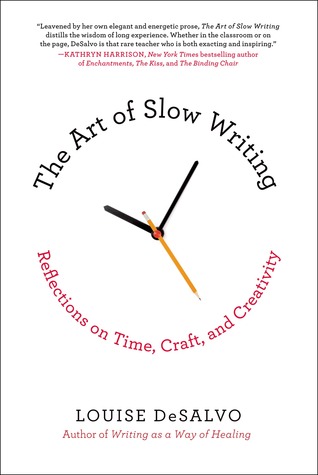 Review by Paula Vince
Review by Paula VinceIn a series of conversational observations and meditations on the writing process, The Art of Slow Writing examines the benefits of writing slowly. DeSalvo advises her readers to explore their creative process on deeper levels by getting to know themselves and their stories more fully over a longer period of time. She writes in the same supportive manner that encourages her students, using the slow writing process to help them explore the complexities of craft. The Art of Slow Writing is the antidote to self-help books that preach the idea of fast-writing, finishing a novel a year, and quick revisions. DeSalvo makes a case that more mature writing often develops over a longer period of time and offers tips and techniques to train the creative process in this new experience.
DeSalvo describes the work habits of successful writers (among them, Nobel Prize laureates) so that readers can use the information provided to develop their identity as writers and transform their writing lives. It includes anecdotes from classic American and international writers such as John Steinbeck, Henry Miller, Virginia Woolf and D. H. Lawrence as well as contemporary authors such as Michael Chabon, Junot Diaz, Jeffrey Eugenides, Ian McEwan, and Salman Rushdie. DeSalvo skillfully and gently guides writers to not only start their work, but immerse themselves fully in the process and create texts they will treasure.
MY THOUGHTS:
When writing, it's easy to allow ourselves to be rushed by deadlines, impatience, or desire for feedback. The crux of Louise DeSalvo's book is to convince us that often, there is no shame in slowing down. Subjects of significance should be threshed out rather than rushed. Necessary reflection takes time, as well as putting it all into words. If our writing projects are important to us, wouldn't we rather end up with the greatest depth possible than a more shallow work full of surface issues and knee-jerk reactions to our topics?
The body of the book helps us to keep slowness in mind from the conception of our books through to the end product. I found that because of its subject matter, I felt free to ponder it for a long time without the guilt of procrastination for not getting on with something else.
Some of my favourite chapters include the necessity of daydreaming, keeping notebooks, and finding our own rhythms. DeSalvo is also a keen foodie who loves to spend time in the kitchen. She considers that being able to start and finish the preparation of a delicious meal within an hour or two is a welcome break from writing, which is more open-ended and often feels like forever. In another chapter, she encourages writers to set up a 'Mise en Place' like a chef's. Just as they have an area where ingredients are already waiting, prepped, measured and organised, we should keep research notes, documentation and resources close at hand.
This is a quite a thick, chunky book, and the chapters are meditative and easy to read, making it well worth reading over and over.
Paula Vince is a South Australian author of contemporary,
inspirational fiction. She lives in the beautiful Adelaide Hills, with its four
distinct seasons, and loves to use her environment as settings for her stories.
Her novel, 'Picking up the Pieces' won the religious fiction section of the
International Book Awards in 2011, and 'Best Forgotten' was winner of the CALEB
prize the same year. She is also one of the four authors of 'The Greenfield
Legacy', Australia's
first and only collaborated Christian novel. Her most recent novel, 'Imogen's
Chance' was published April 2014. For more of Paula's reflections,
please visit her blog, The Vince Review where she
also interviews other authors.


Sounds good, Paula! Thanks for the recommendation. :)
ReplyDeleteThanks Autumn,
DeleteYes, it's a good addition to our shelves of writing resources :) I found I could only order as a hard copy and not a kindle copy too, which I think added to savouring experience.
Sounds like my kind of book, Paula, as I'm a slow writer. Thanks for the recommendation and the detailed review.
ReplyDeleteI tend to be the same, Ian, which is why it was like a breath of fresh air to have somebody convince us that we're doing the right thing, instead of getting caught up in the productivity treadmill.
DeleteGod ideas about the daydreaming and note keeping, Paula. I am now keeping little pads throughout my house. I never know when a great idea or a sentence will come 'out of the blue'. BUT my best ideas come in the middle of the night. I always pray that if they're as good as I think they ae, then the Lord will give my memory a little nudge next day. I used to get up and write them out but couldn't make any sense of it next day.
ReplyDeletecorrection: think they 'are'. Too often they are garbled. Maybe like my sleepy brain!
DeleteI do the same thing with notebooks, Rita, and for the same reason. I've found that although they often come back to my brain, it's not always when they're needed.
DeleteI love the idea of slow writing! Like most others though, I'm conscious of the need to produce for our 'instant' world. Sounds like a book I'd savour. Thanks Paula :)
ReplyDeleteI'm sure you would, Andrea. It really helped me to see how easy it is to get in the productive mindset without even knowing it.
Delete